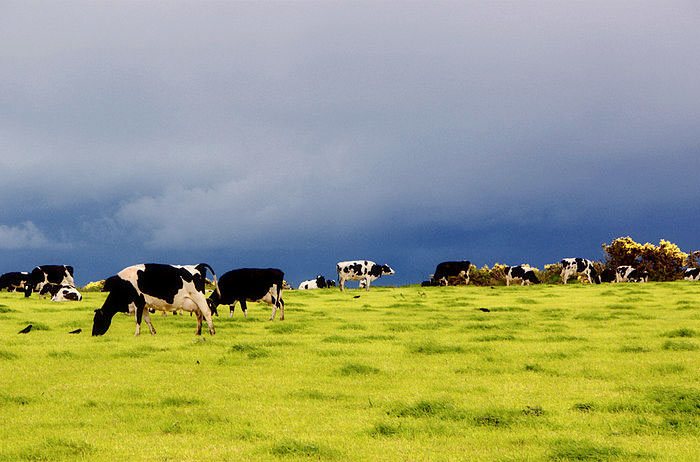
Supermarkets must end their resistance to rises in the cheese market or run the risk of dairy processors shifting milk into alternative products, UK dairy farmers have warned.
On some value and branded lines of cheddar, figures show that supermarkets are making as much as 49 percent gross margin on shop shelf values.
Despite that margin being made at the retail end, those same supermarkets are believed to be stubbornly preventing wholesale cheese prices from lifting to levels that recognises both the cost of production of milk on farms and the rising world demand for dairy products.
That attitude from retailers is leaving those companies who produce cheddar with stark choices to make. These include reducing the volume of cheddar being made, manufacturing milk into alternatives such as milk powder and cutting milk prices to producers.
Farming groups said milk price cuts for those supplying cheese contracts would be wholly unwarranted and avoidable were retailers to pay fairer wholesale prices for their cheddar. That can be achieved by shaving the huge margins they currently make on cheese without pushing consumers to pay more for the product.
“Despite retailer pledges made last year about supporting dairy farmers, the stark reality is that the retailer mark-up on cheese is substantial – significantly ahead of the money they make on fresh milk – and the processor and farmgate share of the value left in the cheese supply chain is not viable and unsustainable" said Nigel Miller, NFU Scotland President.
"Despite the considerable cost burden of producing milk being carried by all dairy farmers, the milk price paid to those supplying cheese contracts is under pressure and, in most cases, is below that of those supplying the liquid milk sector.
Retailer attempts to drive value out of the liquid milk chain were exposed last summer and opposed by both the farming industry and the general public.
"Those same retailers are now resisting rises in wholesale cheese prices, pushing cheese processors to consider changes to their business strategy and denying the dairy farmers supplying them a fair return. That is a high risk approach from supermarkets that could ultimately rob the public of a product that they clearly value should milk processors start to look at alternatives to cheese.
“While there are export markets that must be grown for Scottish and British cheese, the major retailers have the dominant role in sourcing and buying farm assured product for the home market, giving that appropriate shelf space and giving the customer a range of products and prices.
"Our Shelfwatch campaign shows that is happening to a greater or lesser extent in all retailers, although it is disappointing that in some, value and everyday cheddar lines are dominated by non-assured, imported product.
"At the same time, supermarkets have a responsibility to ensure that their buying policy is supportive, balanced and fair – a position that many were keen to reinforce recently on red meat following the horsemeat debacle. While industry is well aware of the current problems in the cheese market, I suspect the general public will be disappointed to hear that, at the moment, the rewards from cheese production are largely filling retailer coffers. Without that balance of margin in the supply chain, both milk producers and processors are under threat.
"This pressure is focused not just on major milk fields such as South West Scotland but is undermining the viability of milk production in more remote cheese-making areas such as Kintyre and Orkney where milk is a vital pillar of the local economy. Given that in Scotland 40 percent of our milk is processed into cheese, it is crucial that the current dysfunctional cheese market is resolved for the sake of consumers, milk processors and milk producers."
What's next for the dairy sector?
With a crisis summit, the ‘SOS’ prices campaign, the introduction of a voluntary code and continued market volatility, it has been an eventful 12 months for the dairy sector.
An NFU-led summit is expected to debate the future of the sector with dairy farmer representatives on Thursday.
It will feature a number of industry leaders and cover a wide range of supply chain issues including the voluntary code for contracts, the registration of producer organisations and the dairy market place.
The line-up of speakers will include NFU dairy board chairman Mansel Raymond, Defra’s head of dairy, Richard Jones, AB-Agri commodity trader Hugh Burton, senior Promar consultant Derek Gardener and dairy futures specialist Liam Fenton of FC Stone.
Raymond said: "This summit presents an important opportunity to support the role of producer representatives and farmers looking to form producer organisations," he said.
"The development of the Dairy Industry Code of Best Practice for contractual Relations places an even greater emphasis on the role of producer representatives in supply chain relationships. We believe it is vital they have all the right tools and information at their disposal.
"So this summit is an ideal opportunity to review the events of the past year, discuss issues like dairy markets, and empower dairy producer representatives to get the best deal for farmers in commercial negotiations."
